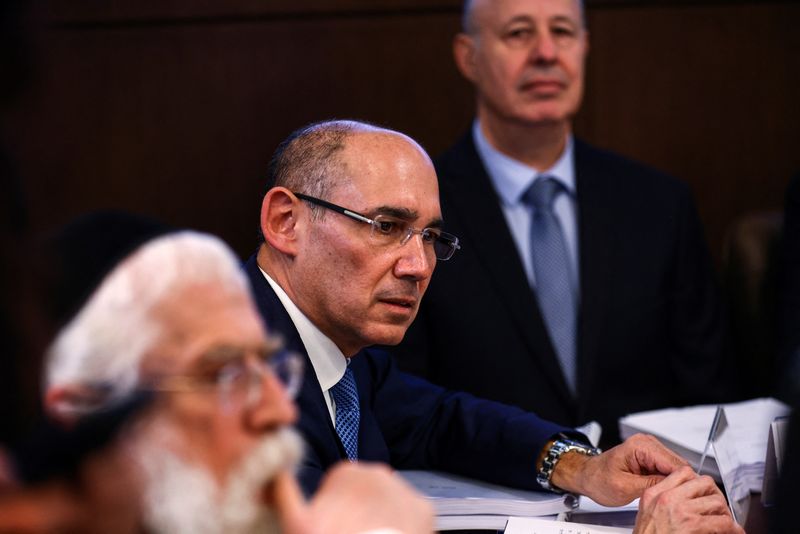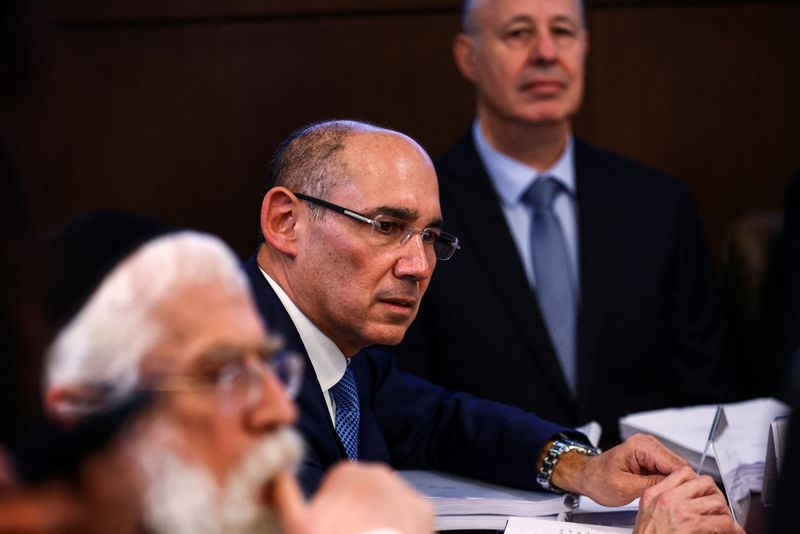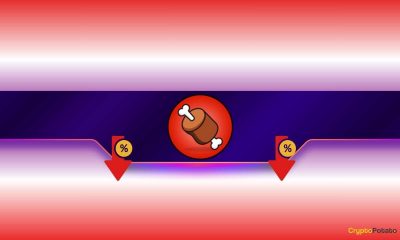Economy
Bank of Israel holds interest rates, eyes turn to possible end of governor’s tenure


© Reuters. FILE PHOTO: Bank of Israel Governor Amir Yaron attends a cabinet meeting at the Prime Minister’s office in Jerusalem, February 23, 2023. REUTERS/Ronen Zvulun/Pool/File Photo
2/2
By Steven Scheer and Ari Rabinovitch
JERUSALEM (Reuters) -The Bank of Israel left interest rates unchanged on Monday citing signs inflation is easing, but its decision was overshadowed by a report – denied by the central bank – that its governor was set to announce he would not seek a second term.
As expected, policymakers kept the benchmark rate at 4.75% for the second meeting in a row, its highest level since late 2006. It had paused at its July 10 meeting after raising short term borrowing costs at 10 consecutive meetings from April 2022, an aggressive tightening cycle that took the main rate from 0.1%.
The central bank had earlier denied a report by one of Israel’s two main radio channels that Governor Amir Yaron would say on Monday that he will not seek to stay on when his current term expires at the end of the year.
“The report this morning by Army Radio that the governor will deliver his decision today regarding the extension of his term is incorrect,” the Bank of Israel said. “As he has said until now, the governor will deliver his decision on extending his term around the (Jewish) holiday season.”
The high holiday season this year is Sept. 16 to Oct. 7.
The issue of whether Yaron will seek or be reappointed for a second term has loomed over financial markets for months.
Them Israeli-born U.S. finance professor, who was nominated by Prime Minister Benjamin Netanyahu in 2018, has been critical of the economic impact of a plan by Netanyahu’s government to overhaul Israel’s judicial system.
He has also clashed with lawmakers over sharp interest rate increases that have boosted bank profits while hurting mortgage holders.
After keeping rates steady – a break with the U.S. Federal Reserve which raised rates in July – the central bank said economic activity remains strong, with a tight labour market. Inflation is broad and high but appears to be slowing.
Many economists believe the hiking cycle is over and that the Bank of Israel will start rate cuts in 2024. The central bank said on Monday, however, that it still saw a real possibility of having to raise in the future “if the inflation environment does not continue to moderate as expected”.
Israel’s annual inflation rate dropped to 3.3% in July from 4.2% in June, its lowest rate since March 2022 but above a government target range of 1-3%.
“The tone of the statement was overall neutral but with one hawkish element: the ‘real possibility’ of further rate hikes reference was not yet removed,” said Citi economist Michel Nies, who sees a rate cut in early 2024.
Part of the path of inflation depends on the shekel, which is at a 3-1/2 year low versus the dollar. The exchange rate, which the central bank has said has a pass through of up to 20% on inflation, has weakened more than 8% so far in 2023.
It was down 0.5% to a rate of 3.815 per dollar in late afternoon trading.
“The shekel’s depreciation in recent months is contributing to the increase in the inflation rate and the path of the exchange rate in the coming months will have an impact on the dynamics of inflation,” the central bank said.
Israel’s economy meanwhile grew at a faster than expected 3.0% annualised rate in the second quarter from the prior three months.
Economy
Russian central bank says it needs months to make sure CPI falling before rate cuts -RBC


© Reuters. Russian Central Bank Governor Elvira Nabiullina attends a news conference in Moscow, Russia June 14, 2019. REUTERS/Shamil Zhumatov/File Photo
MOSCOW (Reuters) – Russia’s central bank will need two to three months to make sure that inflation is steadily declining before taking any decision on interest rate cuts, the bank’s governor Elvira Nabiullina told RBC media on Sunday.
The central bank raised its key interest rate by 100 basis points to 16% earlier in December, hiking for the fifth consecutive meeting in response to stubborn inflation, and suggested that its tightening cycle was nearly over.
Nabiullina said it was not yet clear when exactly the regulator would start cutting rates, however.
“We really need to make sure that inflation is steadily decreasing, that these are not one-off factors that can affect the rate of price growth in a particular month,” she said.
Nabiullina said the bank was taking into account a wide range of indicators but primarily those that “characterize the stability of inflation”.
“This will take two or three months or more – it depends on how much the wide range of indicators that characterize sustainable inflation declines,” she said.
The bank will next convene to set its benchmark rate on Feb. 16.
The governor also said the bank should have started monetary policy tightening earlier than in July, when it embarked on the rate-hiking cycle.
Economy
China identifies second set of projects in $140 billion spending plan


© Reuters. FILE PHOTO: Workers walk past an under-construction area with completed office towers in the background, in Shenzhen’s Qianhai new district, Guangdong province, China August 25, 2023. REUTERS/David Kirton/File Photo
SHANGHAI (Reuters) – China’s top planning body said on Saturday it had identified a second batch of public investment projects, including flood control and disaster relief programmes, under a bond issuance and investment plan announced in October to boost the economy.
With the latest tranche, China has now earmarked more than 800 billion yuan of its 1 trillion yuan ($140 billion) in additional government bond issuance in the fourth quarter, as it focuses on fiscal steps to shore up the flagging economy.
The National Development and Reform Commission (NDRC) said in a statement on Saturday it had identified 9,600 projects with planned investment of more than 560 billion yuan.
China’s economy, the world’s second largest, is struggling to regain its footing post-COVID-19 as policymakers grapple with tepid consumer demand, weak exports, falling foreign investment and a deepening real estate crisis.
The 1 trillion yuan in additional bond issuance will widen China’s 2023 budget deficit ratio to around 3.8 percent from 3 percent, the state-run Xinhua news agency has said.
“Construction of the projects will improve China’s flood control system, emergency response mechanism and disaster relief capabilities, and better protect people’s lives and property, so it is very significant,” the NDRC said.
The agency said it will coordinate with other government bodies to make sure that funds are allocated speedily for investment and that high standards of quality are maintained in project construction.
($1 = 7.1315 renminbi)
Economy
Russian central bank says it needs months to make sure CPI falling before rate cuts -RBC


© Reuters. Russian Central Bank Governor Elvira Nabiullina attends a news conference in Moscow, Russia June 14, 2019. REUTERS/Shamil Zhumatov/File Photo
MOSCOW (Reuters) – Russia’s central bank will need two to three months to make sure that inflation is steadily declining before taking any decision on interest rate cuts, the bank’s governor Elvira Nabiullina told RBC media on Sunday.
The central bank raised its key interest rate by 100 basis points to 16% earlier in December, hiking for the fifth consecutive meeting in response to stubborn inflation, and suggested that its tightening cycle was nearly over.
Nabiullina said it was not yet clear when exactly the regulator would start cutting rates, however.
“We really need to make sure that inflation is steadily decreasing, that these are not one-off factors that can affect the rate of price growth in a particular month,” she said.
Nabiullina said the bank was taking into account a wide range of indicators but primarily those that “characterize the stability of inflation”.
“This will take two or three months or more – it depends on how much the wide range of indicators that characterize sustainable inflation declines,” she said.
The bank will next convene to set its benchmark rate on Feb. 16.
The governor also said the bank should have started monetary policy tightening earlier than in July, when it embarked on the rate-hiking cycle.

 Forex3 years ago
Forex3 years agoForex Today: the dollar is gaining strength amid gloomy sentiment at the start of the Fed’s week

 Forex3 years ago
Forex3 years agoUnbiased review of Pocket Option broker

 Forex3 years ago
Forex3 years agoDollar to pound sterling exchange rate today: Pound plummeted to its lowest since 1985

 Forex3 years ago
Forex3 years agoHow is the Australian dollar doing today?

 Cryptocurrency3 years ago
Cryptocurrency3 years agoWhat happened in the crypto market – current events today

 World3 years ago
World3 years agoWhy are modern video games an art form?

 Commodities3 years ago
Commodities3 years agoCopper continues to fall in price on expectations of lower demand in China

 Economy3 years ago
Economy3 years agoCrude oil tankers double in price due to EU anti-Russian sanctions































